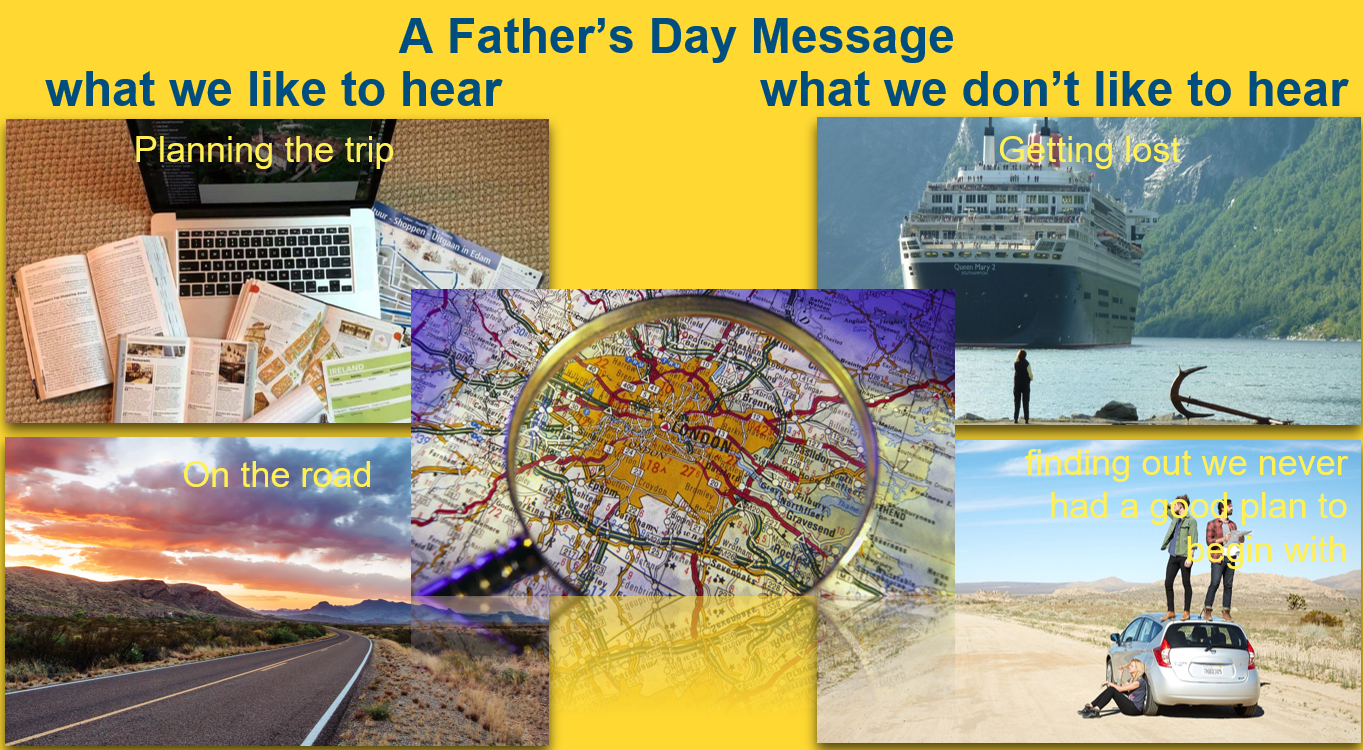Sunday, June 18, 2023 Pentecost 3
Scripture Readings: Genesis 18: 1-15
Matthew 9: 35- 10: 8
“A Father’s Day Message
what we like to hear, and what we don’t”
Welcome to the third Sunday after Pentecost, and much more importantly, a special welcome to Fathers this morning but also to everyone because if you aren’t a father or even a male you most certainly know someone who is. The scripture we’re going to look at this morning, Romans 5:1-8 isn’t an overtly Father’s day Message but it is one I think we all need to hear and listen to and Paul, at least in my thinking, has presented it in a manner very much attuned to that stereotypical and much maligned aspect of male ego that prevents us from asking for help or directions, reading the plans or even admitting things may not be progressing exactly as we anticipated. So I’ve titled our talk today, “A Father’s Day Message - what we like to hear, and what we don’t”
Chapter 5. that we will hear read this morning. is in the infancy of Paul’s argument in his letter to the Romans that leads to the Life in the Spirit chapter, chapter 8, and the 12th chapter on Living the Christian Life. It follows immediately after the famous Faith exposition in chapter 4 and is a turning point in the letter’s rhetoric. So in chapter five Paul is just stepping off the starting line, laying the essential elements for what has become the Christian Faith.
There are two groups of ideas. Verses 1-5 that I call, “what we like to hear”, and verses 6-8, “what we don’t like to hear.” Each with two parts, verses 1-2, “the plan”, verses 3-5, “the execution”, and verse 6, “the problem”, with verses 7-8, “the resolution.”
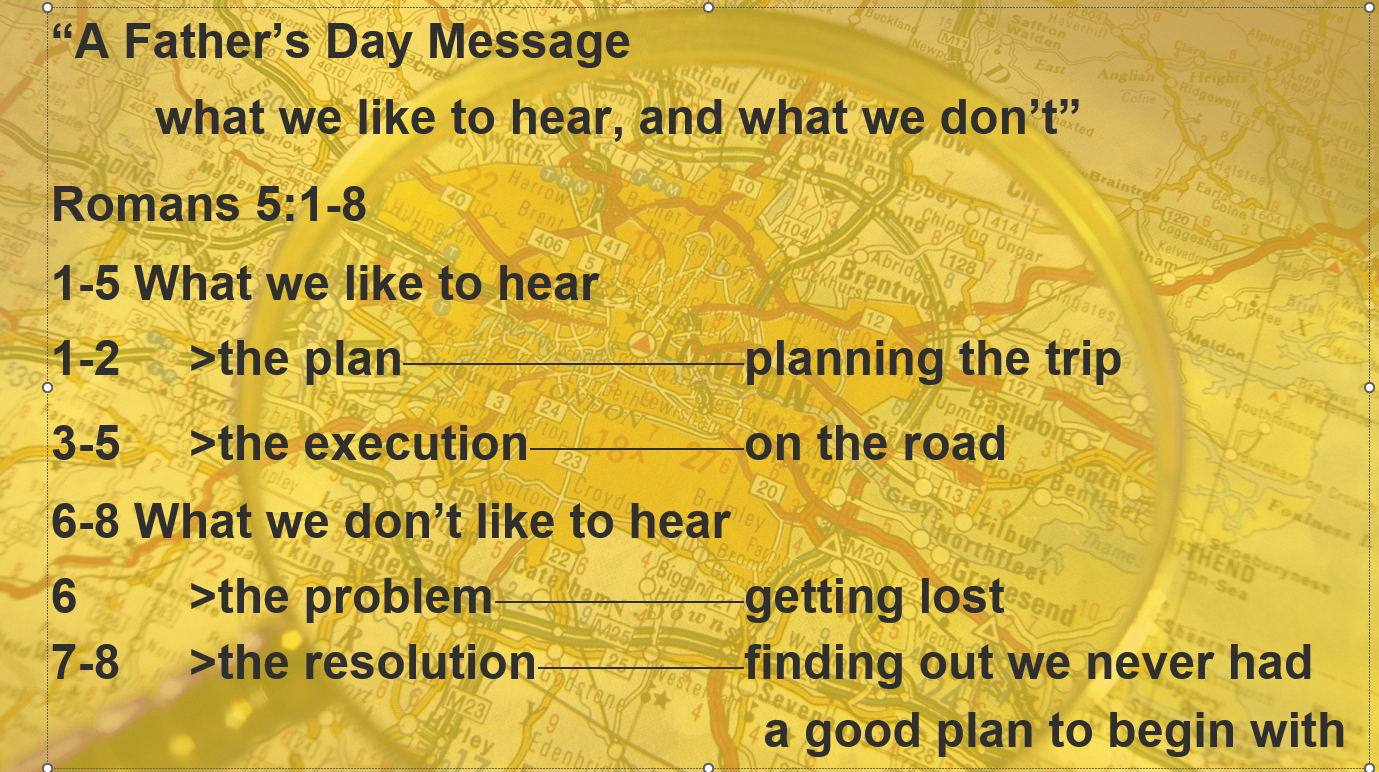
Or, as I like to express it for men, fathers; “planning the trip”, “on the road”, “gettinglost”, and last, “finding out we never had a good plan to begin with.”
We’ve all been to that exciting place we call planning a trip. At least exciting if it's a trip for pleasure, not work, and especially if it’s some long-anticipated destination accompanied by favourite people. You peruse the internet, library, travel magazines; engage a travel consultant. It's like checking out the menu in a top-flight restaurant except better because this is going to last a week or two, not simply an hour at a table. And if you’re a guy like me, this isn’t just a simple task, it’s a mission.
The imagination kicks into high gear, and we’re off. The flights are on time, pleasant and accommodating, even restful. The hotels are staffed by the nicest people who ensure your expectations are exceeded, and there are no surprises. The weather is perfect, the excursions are mesmerizing, the food is superb, and everything you need along the way is ready at hand. In our imagination, it’s akin to what is referred to as “the honeymoon phase” of the project. These first two verses of Romans 5 are like that as well.
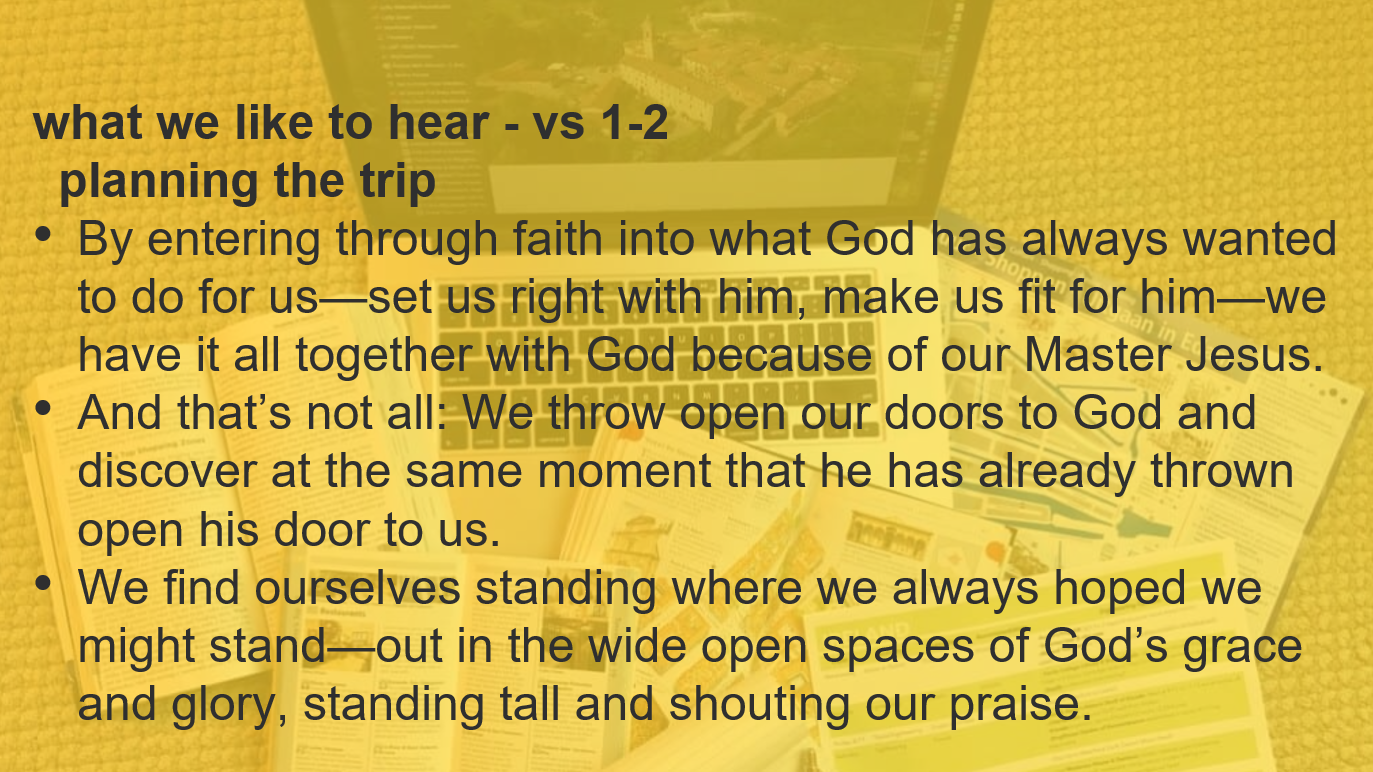
Paul lays out the very best of the Gospel message. More than we could ever have hoped for or imagined. He tells us that God has always wanted to help us get right with him. Not only that he wanted it, but that in Jesus, He has gotten us together with God. And if that wasn’t enough, when we do invite God into our life, we find God’s doors were, for us, already thrown wide open to receive us. We’re not just asking God into our lives, but God had prepared a life for us with Him, with all the glories of His Kingdom included. It would be like walking into your hotel and being told you’ve been upgraded at no cost from the one Queen bedroom to the four-room presidential suite on the top floor. Paul is telling us the reality that God is making for us is bigger than our best vacation-planning dreams. But as if that wasn’t enough, Paul starts us on our trip by saying,
“There’s more to come.”
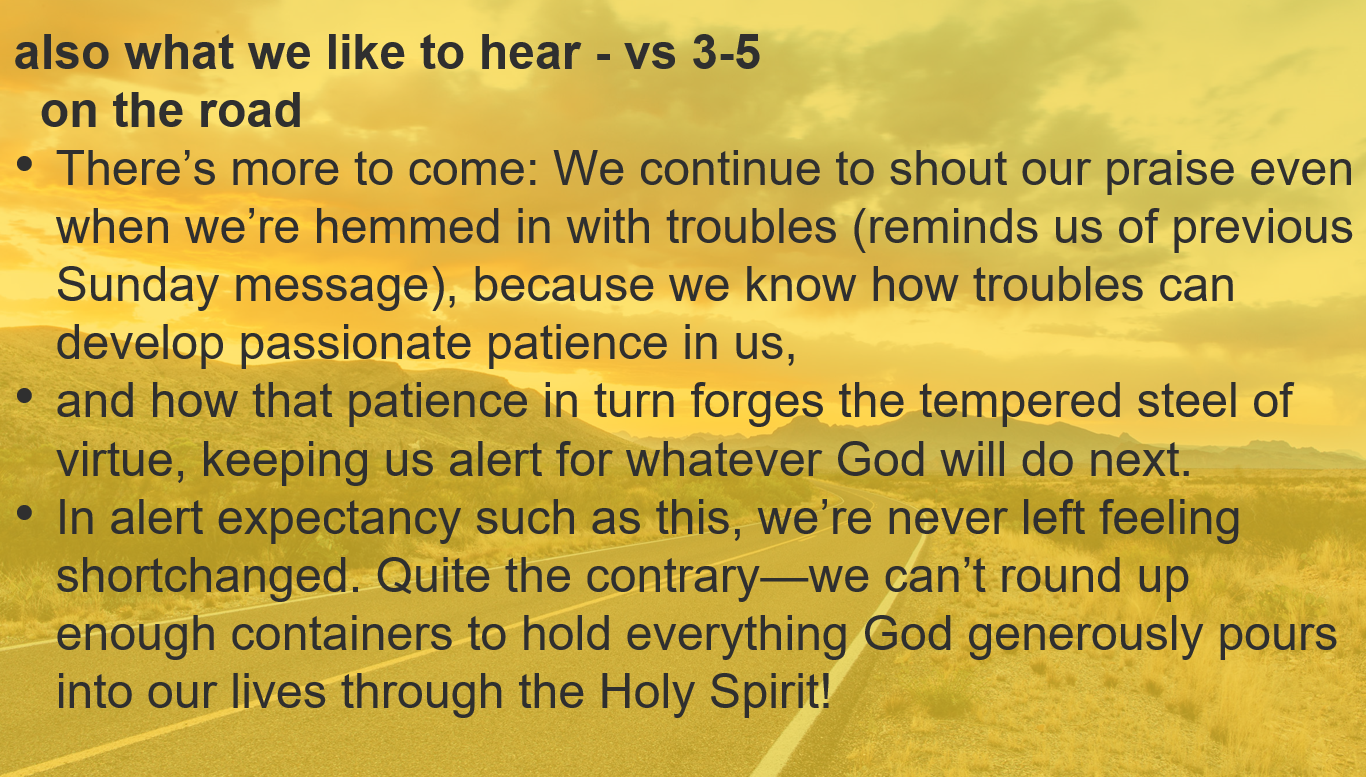
And just like any well-planned vacation, the reality isn’t all glorious. We had to buy new luggage but thank goodness we discovered it before we left on the trip. And there were problems with the passports, but it was, with patience and diligence, all sorted out. The first hotel had overbooked, but we were friendly, forgiving and firm, and they accommodated us in a comparable room in an even better hotel. All these small glitches keep us awake and on our toes so we can anticipate and plan for what’s coming next. We’ve got this and can begin to really enjoy everything we see unfolding on our vacation.
Paul encourages us to continue to praise God in the face of difficulties because good things are going to come of it. Which reminds me of something we talked about on April 16th, the Second Sunday of Easter Family Service. In the sermon, “Proved Genuine,” concerning I Peter 1:3-9. we discussed that why we have troubles was so our faith could be proved genuine, and we alluded to the misinterpretation of Paul’s references to troubles. And here we are, Paul tells us that being hemmed in by troubles produces patience. At that time, we said, and I quote myself here, “Often we justify the difficulties that assail us in life or, worse, attempt to assuage the suffering of others with platitudes drawn from the apostle Paul’s various allusions to building character or persevering in a race.” And here in Romans 5, we see that Paul is not talking about ‘hand ringing’ endurance, the epitome of the stoic suffering saint, but overcoming our troubles with shouts of praise; the evidence that the faith being tried was pure and genuine. Paul is saying the genuine faith that Peter spoke of, when tried, produces passionate patience and, returning to the illusion of smelting metals, goes on to say it “in turn forges the tempered steel of virtue.” Because of this patience and virtue, we’re going to be attuned, alert and attentive to all the blessings and good God is accomplishing, according to His plan, even if it’s not according to our vision.
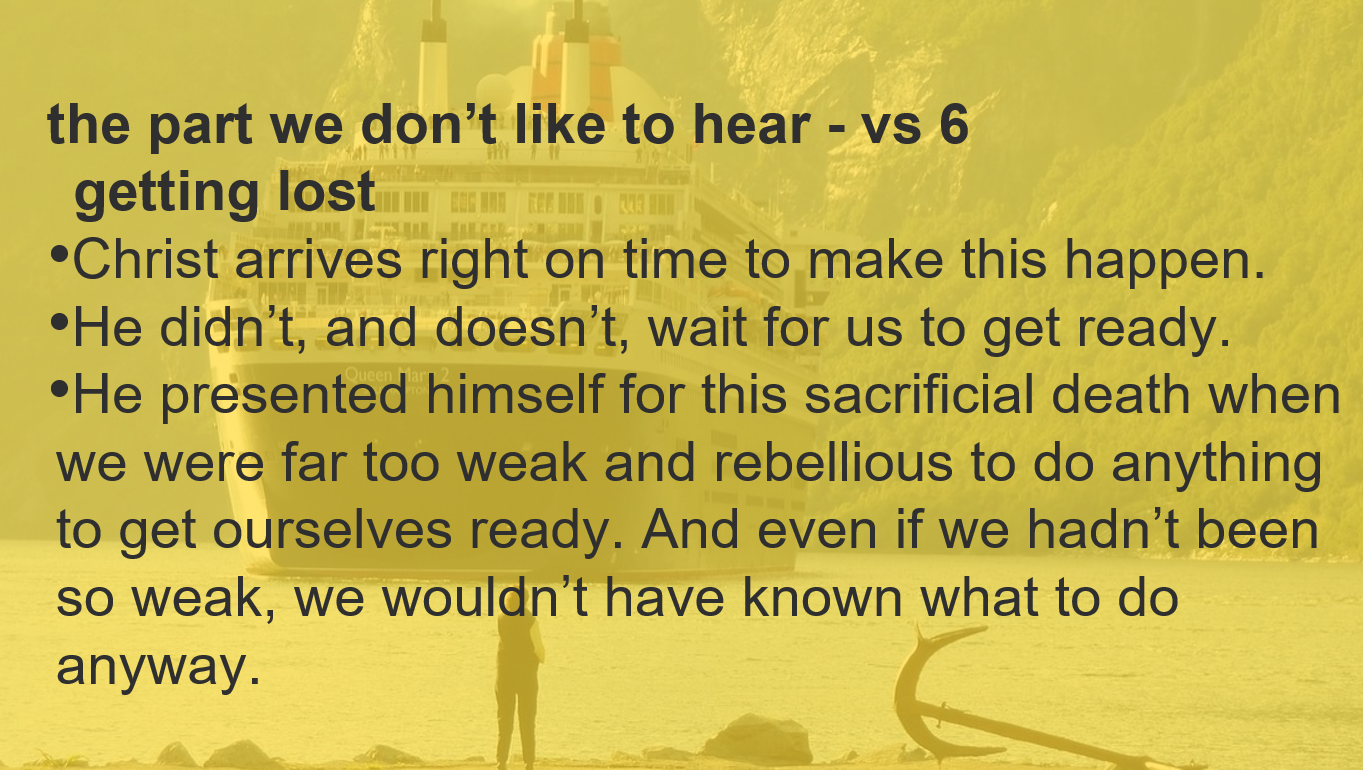
And then, of course, we arrive at the part of our vacation we don’t want to hear about, the problem, when our best planning begins to fall apart. The tour bus left without us, we didn’t make it back to the cruise ship in time for departure, and we’re trying in a foreign country and a foreign language to rent a vehicle to catch it up at the next port of call.
Paul describes this part of our trip in verse 6. God didn’t wait for us to be ready to save ourselves. In everyday life, we very much want to believe we can handle whatever comes along. There is insurance, there are resources, we have a family doctor and a financial planner, and we’ve saved our RRSPs; yes, it may be tough, but the plan was a good one, and we can make some semblance of it work no matter the problems we face. Or as Paul puts it, “we were far too weak and rebellious to do anything” and “we wouldn’t have known what to do anyway.” I think this is where the message is, particularly for the guys, fathers. It doesn’t matter how far south things have progressed. We’re not going to ask for help or directions. We’re guys, we’ve got this.
I don’t know if many of you remember Flame, the annual men's weekend retreat for spiritual refreshment and renewal. It was something like the women’s retreat, Aware. I’m still a part of the organizing committee, and everyone involved agrees that getting men to open up and talk honestly about their challenges, problems, failed hopes, and expectations is almost impossible. We’d rather chop off a leg than tell someone that we feel we really messed up, and especially we won’t ask for help. And yet, most men would agree that shutting up and bucking up is a guaranteed formula for failure. We speak glowingly of teamwork as the best means to the end, and yet how do you put together a team of manufactured egos that won’t talk honestly with each other? And this applies very much to our church communities. How we function together with our ‘best foot forward’ veneers, never admitting a flaw or a weakness, and so never grasping the opportunity for healing, help and growth, although it is right here with us in the presence of the Holy Spirit. We, who know Jesus Christ, far more than anyone else in the world, are to be pitied when we don’t turn to one another for the ready help that is there in each one of us in the presence of Christ’s Spirit and healing power. No one else in the world has this one resource to turn to in times of need.
The good news that Paul is giving us here is that God didn’t wait for us to be ready, to admit we are in need, to seek out each other, or Flame. God chose His time, the right time, to send His Son, Jesus, the Christ, to die for our sins even when we didn’t know we needed Him too. Even when we didn’t care and didn’t have a clue we had any problems we couldn’t solve on our own. And maybe even the problems you face now, that you still believe you can handle. The things you question and don’t understand even now that you hide away even from yourself because you say, “I’ve got this, just as long as I don’t mention it to anyone else, or myself.” But Jesus isn’t waiting for you to be ready, or to ask for help. He’s stepped up and already solved the problem, whatever it is. Mentioning it is for you. You’re carrying a back-breaking burden for no good reason because the problem the burden was meant to fix, has already been taken away.
As men in particular, but all of us, I think, need to really grasp this truth. Jesus has already healed you. What you need to do is get up and walk. Whatever fears burden you, the cause has already been cured by our Lord Jesus, and we can look to one another to free ourselves in truth and community.
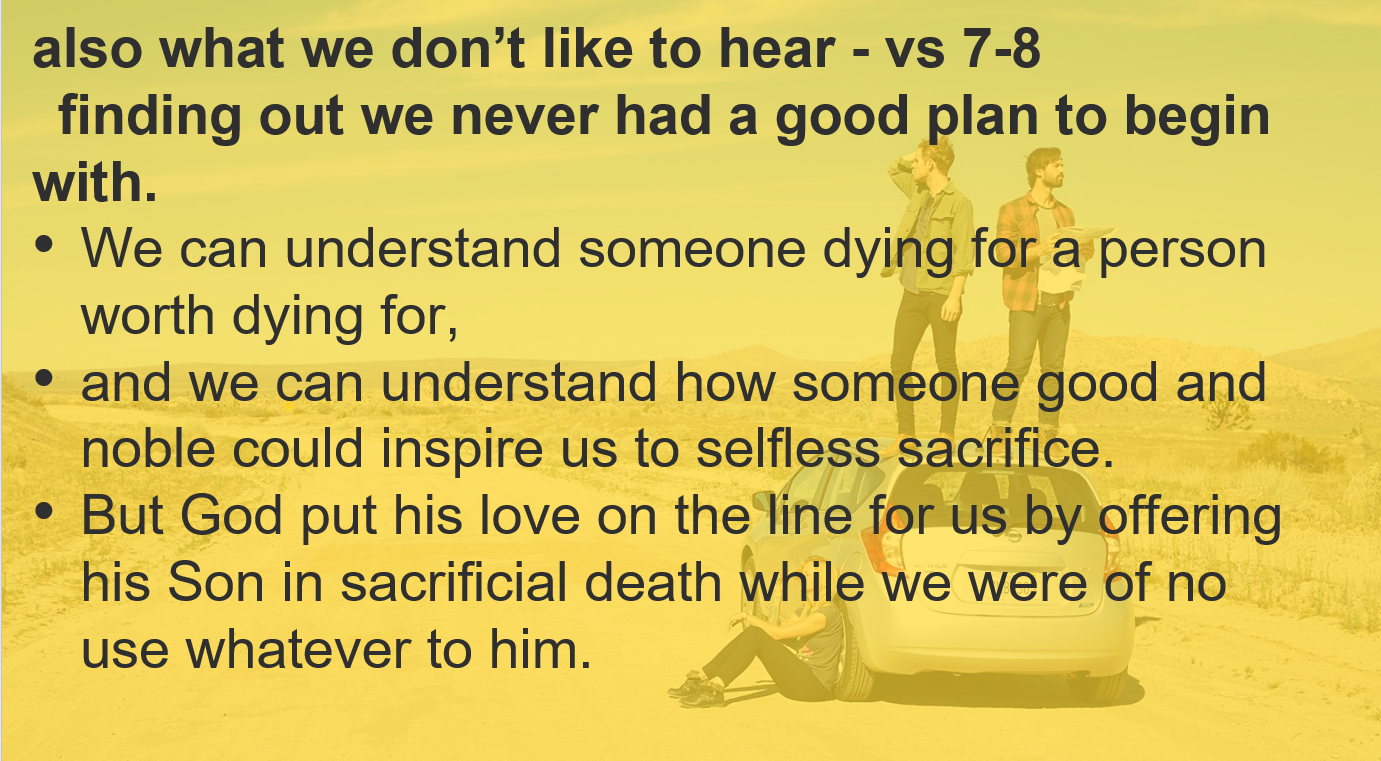
The vacation, however, isn’t finished yet, and neither is Paul. When we finally make it home from our trip it’s time to assess the damage. How much did we go over budget? The bills keep coming in for things we never anticipated. Damages to the uninsured car rental. And the list goes on until when asked, “How was the holiday?” you reply, unable to fabricate any longer, “An unmitigated disaster!” From before you left home till you returned, you can’t cite a single thing that went according to plan. And Paul gets this dead to rights.
We just can’t conceive, we don’t have the capacity to understand a plan that will salvage our lives or the human race. The best we can do is “understand someone dying for a person worth dying for” or maybe “how someone good and noble could inspire us to selfless sacrifice”; we see these scenarios in the movies all the time. but for God to offer “his Son in sacrificial death while we were of no use whatever to him” is an idea way above our pay grade.
I think this would be the only substantial criticism I have of C.S. Lewis’s, “The Lion, the Witch, and the Wardrobe.” That it wasn’t until Edmund, who had betrayed his brother and sisters, reconsidered what he had done and its consequences, that Aslan, Lewis’s archetype of Christ, exchanged his life for him. Paul says God put His love on the line before we had any conception that we were even doing anything wrong. Our plans were perfect, everything was in order, we couldn’t conceive of anything going wrong, and we certainly didn’t need any help, advice and certainly not directions.
As I said in the introduction, Paul summarizes this Gospel message with a mind to his male audience. If he had begun with verses 7 and 8 and then 6, what we don’t like to hear, that our best plans and efforts were a formula for disaster, he’d have lost his audience right away. Instead, Paul wisely begins with what a glorious plan Jesus has created for us and is working out in our lives day by day, with resources to turn every obstacle into a victory. The hard part for us to get around is that this is being done for us. To let go of our plans and expectations, our ideas of what should be and will be is to admit that we aren’t doing any of this. It is to be humble. And that is something almost impossible for us to do, at least, on our own.
If we ask, God is gracious, and will help us to do even that.
Amen

